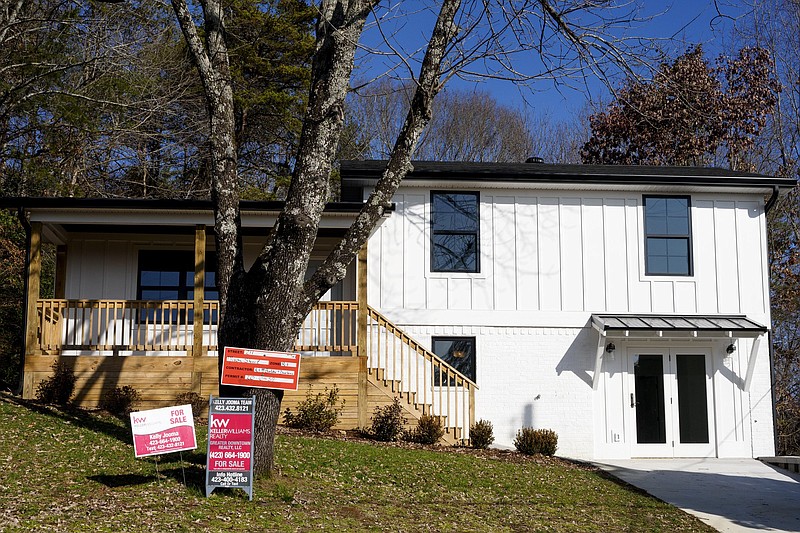The issue of housing affordability in Chattanooga continues as a storyline running counter to the city's well-documented and praised resurgence. As the area continues to make lists as a top place for remote work or to start a business, its housing market is becoming increasingly out of reach for many residents.
On Tuesday, Chattanoogans in Action for Love, Equality and Benevolence released its report presenting a possible solution to keep homeownership attainable for area residents who are otherwise being priced out.
In the feasibility study, CALEB advocates for the city to adopt a community land trust, a model in which a managing nonprofit owns the land and uses subsidies to lease it long term to limited-income individuals or families at an affordable rate. Dozens of communities across the country operate such trusts, particularly in areas that are experiencing or have gone through major economic change.
Michael Gilliland, organizer and director with CALEB, said the model addresses the increasing costs of buying a home, which is being driven in part by outside real estate companies and new residents competing for a limited number of homes.
A report last month from the National Association of Realtors found Chattanooga home prices in the last quarter of 2020 increased more than 22% faster than the nation's average. A separate study from 2020 listed Chattanooga as among the worst cities in the country for affordable home prices for its residents.
"You have a market that's incentivized toward out-of-town people moving in with greater access to means and capital that are able to price out working-class Chattanoogans," Gilliland said.
In the community land trust model, households making between 60% and 80% of the area median income - between about $27,000 and $36,500 annually, according to U.S. Census data - could qualify for the program and begin looking for a house. Rather than offering homes already purchased, the land trust program CALEB is promoting lets potential buyers find a home they want. The land trust then uses public or private subsidies to make the home price affordable.
Learn more about community land trusts
Chattanoogans in Action for Love, Equality and Benevolence is hosting a presentation to discuss the community land trust on March 17 at 12 p.m. on Facebook. The event can be accessed by visiting: facebook.com/events/160231672609971
The trust would own the property but lease it to the buyer on a 99-year inheritable and renewable lease. If the homeowner chooses to sell the property later, the lease agreement limits the amount the property can be sold for to keep the home accessible to another buyer who is income limited, while still letting the original homeowner build equity in the sale of the property.
Research has emphasized the role such trusts can play in helping close racial wealth gaps by allowing income-limited individuals to access the real estate market. Median white household income in Chattanooga was $55,674 in 2019, compared to $30,539 for Black households and $42,944 for Hispanic households, according to the U.S. Census.
The study released Tuesday emphasizes the need to act quickly. The more home prices increase, the more expensive it will be to help area residents buy a home or otherwise stay in the area.
An initial investment of $5 million would make homeownership accessible to an estimated 110 limited-income households in the first five years, according to the study. Extended over 30 years, the same $5 million investment would serve 330 homes. The estimates are based on each home in the first five years needing nearly $45,000 in subsidy to join the community land trust. Over 30 years, because the homes stay in the trust, the average subsidy per home drops to nearly $15,000.
Since the trust owns the land, the asset is kept to be used for affordable housing for another family or individual. This keeps the cost of the subsidy down because the trust controls the resale price, Gilliland said. Other models offering subsidies against the market price for a home require more subsidies with each new buyer to make the home affordable.
The larger the trust becomes, in terms of the number of homes in operation, the more self-sustaining the model becomes, Gilliland said.
"The question of sustainability is really a question of political will," he said. "Does the city of Chattanooga and the community, is it willing to believe in this model enough to really invest in it?"
Both mayoral candidates slated for the April 13 runoff election have affordable housing as a policy priority. The two campaigns have said they will use subsidies and work with existing groups to help address the problems. Chattanooga Neighborhood Enterprise has also met with candidates to discuss support for its plan to improve local neighborhoods.
CALEB's study requests a meeting with local elected leaders to discuss the community land trust as part of a comprehensive affordable housing plan. Gilliland said he is encouraged by the support those in office and those seeking office have shown for addressing the problem.
Contact Wyatt Massey at wmassey@timesfreepress.com or 423-757-6249. Follow him on Twitter @news4mass.

